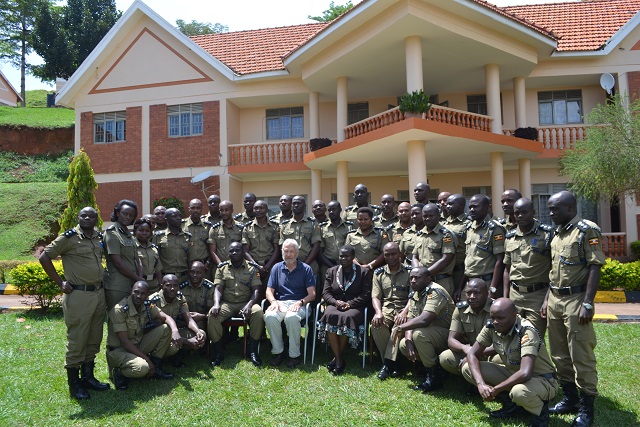Expanding and spreading the spirit of peacebuilding and conflict resolution, DUT’s Professor Geoffrey Harris conducted tools for conflict resolution and transformation course to 38 senior Ugandan police officers.
Professor Harris is a Professor at DUT’s Centre for Nonviolence Research and Post graduate Support.
The Ugandan officers that participated in the course are currently studying towards their Master’s degree in Peace, Governance and Security through UPEACE in Addis Ababa. The course, facilitated and conducted by Prof Harris, took place at the Senior Command and Staff College at Bwebaija near Kampala, Uganda. The course focused on topics that defined conflict, violence and peace. Furthermore the course also outlined alternative ways of dealing with conflict and the strength of non-violence, as well as, personal styles of dealing with conflict. Conflict transformation and the nonviolent tools for conflict transformation, including traditional African ways- forgiveness, reconciliation and restorative justice formed part of the priority topics discussed during the course.
“As a result of studying the course, my hope was that students understand the main concept of conflict, violence and peace; understand the main approaches to dealing with conflict and their strengths and limitations. I also hoped that they will be able to identify the style commonly used in dealing with conflict and its strength and limitations,” said Prof Harris.
The primary objective of the course was for students to be able to analyse different types of conflict and to select and apply effective nonviolent tools to resolve conflict. Understanding of the concept of conflict transformation and the range of nonviolent tools available to promote peace was also another objective of the course.
The course plays a vital role considering the history profile of Uganda. The country has long been divided along national, religious and ethnic lines. There have been various attempts by militant groups to displace government both within and beyond Ugandan borders. On completion of the course, the students (Ugandan police officers) were given a small research project that consisted of Assignment 1 (1000 words) which required them to look at Cornelius and Fair and Krybill’s Five Conflict handling modes whilst identifying their usual responses, their default position to conflict giving recent examples where they used their response. Assignment 2 (3000 words) was based on the recent finding of Erica Chenoweth and Maria Stephan that nonviolent campaigns have been far more effective than nonviolent campaigns in achieving their objectives such as regime change, secession and expelling foreign occupiers, the students were asked to review their evidence by selecting three of the main conflicts occurring in Uganda.
“The police officers were very welcoming and they were an engaged and insightful group,” said Professor Harris.
– Noxolo Memela
Pictured: Professor Geoffrey Harris with the Ugandan police officers.


